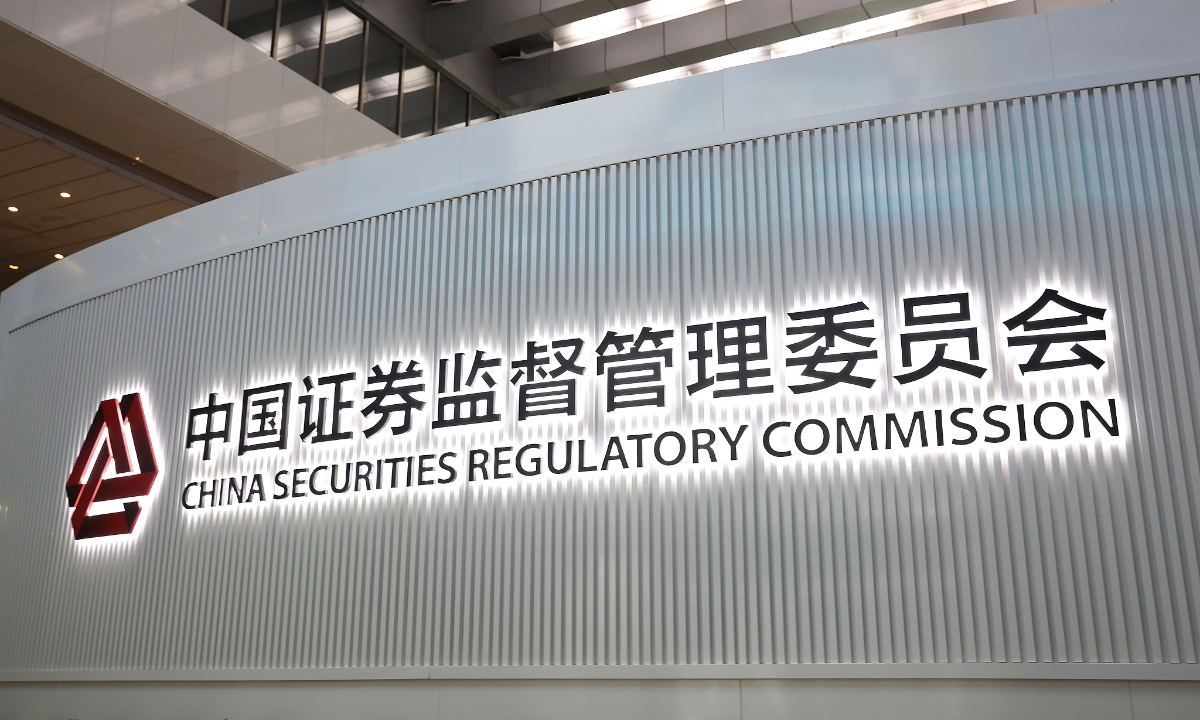
China Securities Regulatory Commission (CSRC) in Beijing Photo:VCG
Following what has been a whirlwind week in the Chinese stock market, marked by swift efforts to tackle volatility, China on Wednesday appointed a new chief of the country's top securities regulatory agency.
Wu Qing, once dubbed as "the terminator of problematic brokers," has deep expertise in market regulation, specifically in tackling risks.
The Communist Party of China (CPC) Central Committee has made a decision to appoint Wu as secretary of the Party committee of the China Securities Regulatory Commission (CSRC), replacing Yi Huiman.
The State Council, the cabinet, also made a decision to appoint Wu as chairman of the CSRC, replacing Yi, the Xinhua News Agency reported on Wednesday.
With the appointment, Wu becomes the 10th chairman of the CSRC. Before his appointment on Wednesday, Wu was a deputy secretary of the Shanghai Municipal Committee of the CPC and secretary of the Political and Legal Affairs Committee of the CPC Shanghai Municipal Committee. Between 2010 and 2024, Wu held various posts in Shanghai, including as the Party secretary and chairman of the Shanghai Stock Exchange briefly from May 2016 to December 2017.
Before Shanghai, Wu, a native of Mengcheng, in East China's Anhui Province, had extensive experience working at the CSRC, where he rose from a general staffer to the head of the risk disposal office for securities firms and the head of the fund supervision department.
As the head of the risk disposal office, Wu specialized in tackling risks of problematic securities firms. During his tenure, the office handled a total of 31 problematic securities firms, according to a report from financial news portal cls.cn, which is affiliated with the Shanghai United Media Group.
His tenure at the CSRC earned him such nicknames as "the doctor of brokers" and "the terminator of problematic brokers," the report said.
During his time as the head of the CSRC's risk disposal office, Wu advocated for strengthened supervision of the securities market. In an article he wrote in 2009, Wu, citing failures in US securities regulations, pointed out that financial institutions' willingness to self-regulate and their actual regulation are often unreliable, so there must be no loopholes in financial supervision, according to the Securities Times.
When facing a stock market, real estate market or financial crisis, what needs to be saved is definitely not or cannot be just an individual institution or an individual market; Instead, the focus should be on addressing the underlying economic, mechanism and institutional issues, Wu wrote in the article, according to the Security Times.
During Wu's tenure, the Shanghai Stock Exchange strengthened the responsibilities of a front-line supervisor, focused on preventing and punishing "unfair trading," and intensified in-process interventional supervision, said the report on cls.cn.
Ahead of the announcement of Wu's appointment on Wednesday, China moved swiftly to stabilize the stock market. On Tuesday,
Chinese stocks reportedly recorded the biggest gains in 14 months, reversing previous losses, after state-owned Central Huijin Investment - deemed as a key player in the "national team" - pledged to ramp up investment in the A-share market.
On Wednesday,
Chinese stocks rose for a second consecutive day, with the daily turnover exceeding 1 trillion yuan ($139 billion).
Global Times




